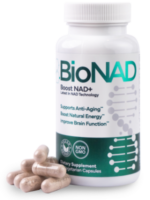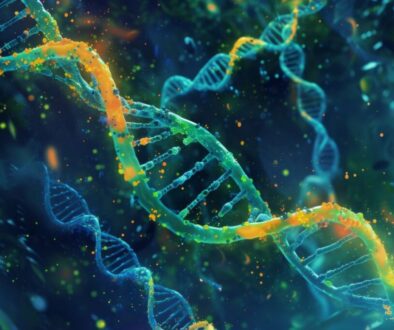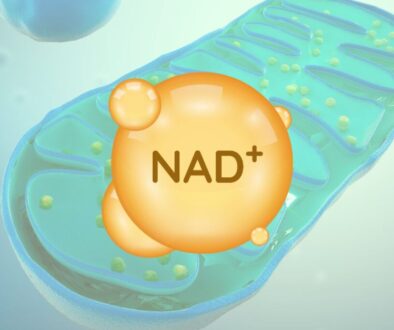NAD+ And Heart Palpitations: How Does NAD+ Affect The Heart?

Published March 6, 2025
Feeling sluggish or experiencing unexpected heart flutters? Nicotinamide adenine dinucleotide (NAD+) is crucial for overall cellular health. It might be the key molecule your body needs. This powerful compound is key to energy production, mitochondrial function, and cellular repair. Emerging research slows its key role in heart health. It may be linked to heart palpitations and arrhythmias. If your energy levels and heart rhythm feel out of sync, NAD+ could be the solution to restoring balance and vitality.
In this article, we’ll explore the fascinating relationship between NAD+ and heart health, focusing on NAD heart palpitations and their impact on overall well-being.
The Vital Role Of NAD+ In Cardiovascular Health
NAD+ is vital for cardiovascular health. It affects heart muscle contractions and blood flow regulation. Research shows disruptions in NAD+ processes may cause irregular heart rhythms, like arrhythmias and palpitations. Scientists are studying links to find new treatment options. This could lead to a better understanding and management of heart health.

What Is NAD+?
NAD+ (nicotinamide adenine dinucleotide) is an essential coenzyme in every living cell. It plays a key role in the body’s energy production. NAD+ supports redox reactions, which convert nutrients from food into energy. It acts as an electron carrier to drive these processes, which use energy for vital cellular functions. Without NAD+, cells could not produce the energy necessary to survive and perform their roles effectively.
The Role Of NAD+ In Energy Metabolism And Mitochondrial Function
Often called the powerhouses of the cell, mitochondria rely on NAD+ to generate ATP (adenosine triphosphate), the body’s primary energy source. ATP fuels almost every cellular process, including heart contractions, brain activity, and organ function.
NAD+ is vital for the mitochondrial electron transport chain. This system creates ATP by transferring electrons and generating energy. When NAD+ levels drop, mitochondrial function weakens. This reduces energy production and impacts overall health and vitality.
The Role Of NAD+ In Combating Oxidative Stress And Supporting Cellular Repair
NAD+ is crucial for energy production and reducing oxidative stress. Oxidative stress develops when there’s an imbalance between free radicals and antioxidants, resulting in cell damage. NAD+ aids in supporting antioxidant defenses, including sirtuins.
Sirtuins are proteins that help repair damaged DNA, regulate inflammation, and protect cells from aging and toxins. These processes are vital for cardiovascular health.
Oxidative stress and inflammation are primary contributors to heart disease and aging-related conditions. Maintaining healthy NAD+ levels promotes cellular resilience, slows aging, and reduces the risk of chronic illnesses.
NAD+ And Cardiovascular Health
NAD+ plays a critical role in metabolic processes. It has been linked to better heart function and vascular health, making it a key focus in cardiovascular wellness research.
Supporting Heart Function
The heart is one of the body’s most energy-demanding organs, relying on mitochondria to power its constant rhythm. Central to this process is NAD+, a key molecule that supports mitochondrial function and energy production. When NAD+ levels drop, the heart’s energy supply can weaken, increasing the risk of heart failure or arrhythmias. Maintaining healthy NAD+ levels is vital for the heart’s energy needs and long-term function.
Endothelial Function And Blood Flow Regulation
Endothelial cells, which line blood vessels, are crucial for vascular health. NAD+ boosts nitric oxide (NO) production, a molecule needed for vasodilation. Vasodilation widens blood vessels to ensure proper blood flow and helps supply oxygen and nutrients to tissues. Low NAD+ levels can reduce nitric oxide, which may cause poor circulation and increase the risk of high blood pressure, atherosclerosis, and other heart problems.
Mitigating Oxidative Stress And Reducing Heart Inflammation
Oxidative stress and inflammation are significant elements in cardiovascular diseases. These include conditions like coronary artery disease and heart attacks. NAD+ helps defend against these processes. It activates enzymes like sirtuins to protect cells and repair damaged DNA. Low NAD+ levels, however, worsen oxidative stress and inflammation, speeding up cardiovascular decline. Restoring NAD+ can lower these risks. It helps protect the heart and supports vascular health. You can restore NAD+ through therapies, supplements, or lifestyle changes.
Can NAD+ Cause Heart Palpitations?
Heart palpitations feel like irregular, skipped, or rapid heartbeats. Hormonal imbalances, stress, or heart conditions can cause them.
NAD+ And The Autonomic Nervous System
NAD+ helps regulate the autonomic nervous system, which controls involuntary functions like heart rhythm. Disruptions in NAD+-dependent processes may affect electrical signals in the heart, contributing to arrhythmias.
Is There A Link Between NAD+ Supplementation And Arrhythmias?
Some reports suggest that NAD+ supplementation could affect heart rhythm. These effects may occur in specific individuals. However, scientific evidence directly linking NAD+ to arrhythmias is still limited. Further research is required to better understand any potential connections or risks.
What Research Reveals On NAD Heart Palpitations Connection
NAD+ is crucial for energy production and health, but new research links it to heart palpitations. Exploring this connection could reveal how NAD impacts heart function and irregular rhythms.
NAD+ And Heart Function
New research highlights NAD+ as a key regulator of cardiac sodium channels (Nav1.5). These channels are crucial for maintaining the heart’s electrical rhythm. Higher NAD+ levels may improve their function. This could help reduce the risk of arrhythmias.
Benefits Of NAD+ Precursors
Studies on NAD+ precursors, such as nicotinamide mononucleotide (NMN) and nicotinamide riboside (NR), suggest significant benefits for heart health. These supplements improve cardiac performance in preclinical models and reduce oxidative stress, offering hope for future therapies.
Should You Be Concerned About NAD+ And Heart Palpitations?
NAD+ supplements are generally considered safe. People with arrhythmias or heart conditions should be cautious. Supplementation may not be safe for them.
Guidelines For Safe Use
- Start low and go slow. Begin with a lower dose of NAD+ precursors to assess your tolerance.
- Typical daily doses of NMN or NR range between 250 to 500 mg.
- Avoid exceeding the recommended dosage unless under medical supervision.
When To Consult A Doctor
If you have unexplained heart palpitations or worsening arrhythmias while taking NAD+ supplements, see a doctor immediately. Seek medical help right away for symptoms like dizziness or shortness of breath.

Frequently Asked Questions
Do NAD+ supplements cause heart palpitations?
While no solid evidence links NAD+ supplements to heart palpitations, individual reactions can differ. It’s always a good idea to consult a healthcare professional before including any new supplement in your routine.
How does NAD+ deficiency impact heart health?
Low NAD+ levels can disrupt energy production, leading to mitochondrial dysfunction, increased oxidative stress, and inflammation. These issues strain the heart and affect its ability to work correctly.
Which NAD+ precursors are most beneficial for cardiovascular health?
NMN and NR both hold significant potential for supporting heart health. These precursors restore NAD+ levels, combat oxidative stress, and strengthen the heart’s resilience, making them valuable for cardiovascular health.
Is NAD+ safe for individuals with heart conditions?
In most cases, yes. However, people with arrhythmias or heart conditions should consult their doctor first to ensure safety and address potential risks.
Why Choose BioNAD?
Support your heart health with the power of NAD+ through BioNAD, a premium solution crafted for optimal results. BioNAD is specifically formulated to boost energy metabolism, improve mitochondrial function, and promote cardiovascular wellness. Maintaining healthy NAD+ levels reduces oxidative stress, enhances blood flow, and supports a healthy heart rhythm. With superior formulations designed for maximum bioavailability and effectiveness, BioNAD ensures you get the most out of every dose.
Powered by advanced research, BioNAD harnesses the effectiveness of NAD+ precursors such as nicotinamide mononucleotide (NMN) and nicotinamide riboside (NR) to replenish NAD+ levels, fight fatigue, and boost overall vitality. For those looking for a safe, effective solution to support cardiovascular and cellular health, BioNAD stands as a trusted choice.
Empower Your Heart: The Role Of NAD+ In Cardiac Health
NAD+ is essential for cellular health and is critical in supporting cardiovascular function. It boosts energy metabolism, reduces oxidative stress, and regulates electrical activity. This helps support a healthy heart. The debate around NAD heart palpitations is ongoing. However, new studies suggest restoring NAD+ levels may have benefits. If you’re considering supplements, consult a healthcare professional. Follow safe usage guidelines to reduce risks and get the most out of it. Take control of your heart health with NAD+ supplements today.

Try BioNAD Now & Experience The Boost!
NAD+ (Nicotinamide Adenine Dinucleotide) is a crucial coenzyme found in every cell of your body, playing a vital role in cellular energy production and metabolism. BioNAD supplements aim to elevate your NAD+ levels, providing numerous health benefits.

About The Author
Meet Corinne Grace, a nurse with a passion for writing. Her expertise lies in health and wellness topics, where she blends academic knowledge with engaging story telling.

This Content Has Been Reviewed For Factual Accuracy
This content has undergone thorough fact-checking by our team of experts. Learn more about the editorial standard for our website here.




